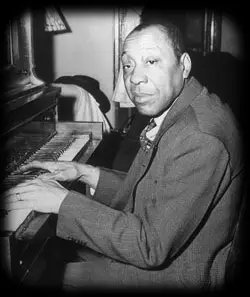JIMMY YANCEY
 Jimmy Yancey was a veteran Blues and boogie pianist who was very influential on the younger Chicago players who started the boogie-woogie craze of the late thirties. Jimmy did not make a record until he was over 40 years old, but his elegant playing on the club and rent-party circuit in Chicago was legendary. Although he was not famous outside his hometown at this time, Jimmy’s distinctive repeating left-hand patterns wrote the book on boogie-style piano and he is remembered today as a true innovator of Blues piano.
Jimmy Yancey was a veteran Blues and boogie pianist who was very influential on the younger Chicago players who started the boogie-woogie craze of the late thirties. Jimmy did not make a record until he was over 40 years old, but his elegant playing on the club and rent-party circuit in Chicago was legendary. Although he was not famous outside his hometown at this time, Jimmy’s distinctive repeating left-hand patterns wrote the book on boogie-style piano and he is remembered today as a true innovator of Blues piano.
In 1894, James Edwards Yancey was born in Chicago and was soon touring on the vaudeville circuit with his father and brother. Jimmy would sing and tap-dance while his brother Alonzo played ragtime piano. They toured the States and Europe before WWI, and when they returned to Chicago in 1915, Jimmy started to learn piano himself.
A couple of years later he married Estella Harris, who played guitar and sang in Church. They would play together as ‘Mama and Papa’ Yancey at informal events all over Chicago, and they would occasionally play club gigs. Young men like Pete Johnson, Meade ‘Lux’ Lewis and Albert Ammons, who would start the up-tempo boogie-woogie craze in 1939, would have been aware of Jimmy’s technique, although his medium paced style was never frantic and his rhythms often had a syncopated Latin feel.
Jim Piano Red’s animation of Yancey’s Stomp;
Jimmy got a job as groundskeeper at the Chicago White Sox stadium in 1925, and he kept that position at Comiskey Park for twenty five years, when ill health forced him to retire. He was a pretty good baseball player himself, but not quite good enough to turn fully professional.
Jimmy’s command of timing and expert riffing on show here;
Jimmy and Estella played a concert at New York’s Carnegie Hall in 1948, and this led to them recording ‘Pure Blues’ for the new Atlantic label in 1951. Estella continued her career for another thirty years , but unfortunately Jimmy suffered from diabetes, and this contributed to a stroke that took his life in 1951.